人教版英语七年级英语句型及语法(英语一般将来时)含答案推荐精选
- 格式:doc
- 大小:159.00 KB
- 文档页数:18
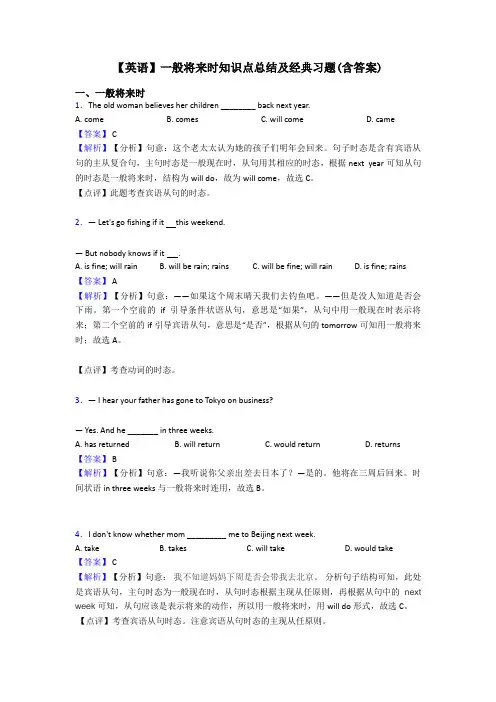
【英语】一般将来时知识点总结及经典习题(含答案)一、一般将来时1.The old woman believes her children ________ back next year.A. comeB. comesC. will comeD. came【答案】 C【解析】【分析】句意:这个老太太认为她的孩子们明年会回来。
句子时态是含有宾语从句的主从复合句,主句时态是一般现在时,从句用其相应的时态,根据next year可知从句的时态是一般将来时,结构为will do,故为will come,故选C。
【点评】此题考查宾语从句的时态。
2.— Let's go fishing if it this weekend.— But nobody knows if it .A. is fine; will rainB. will be rain; rainsC. will be fine; will rainD. is fine; rains 【答案】 A【解析】【分析】句意:——如果这个周末晴天我们去钓鱼吧。
——但是没人知道是否会下雨。
第一个空前的if引导条件状语从句,意思是“如果”,从句中用一般现在时表示将来;第二个空前的if引导宾语从句,意思是“是否”,根据从句的tomorrow可知用一般将来时;故选A。
【点评】考查动词的时态。
3.— I hear your father has gone to Tokyo on business?— Yes. And he _______ in three weeks.A. has returnedB. will returnC. would returnD. returns【答案】 B【解析】【分析】句意:—我听说你父亲出差去日本了?—是的。
他将在三周后回来。
时间状语in three weeks与一般将来时连用,故选B。
4.I don't know whether mom _________ me to Beijing next week.A. takeB. takesC. will takeD. would take【答案】 C【解析】【分析】句意:我不知道妈妈下周是否会带我去北京。
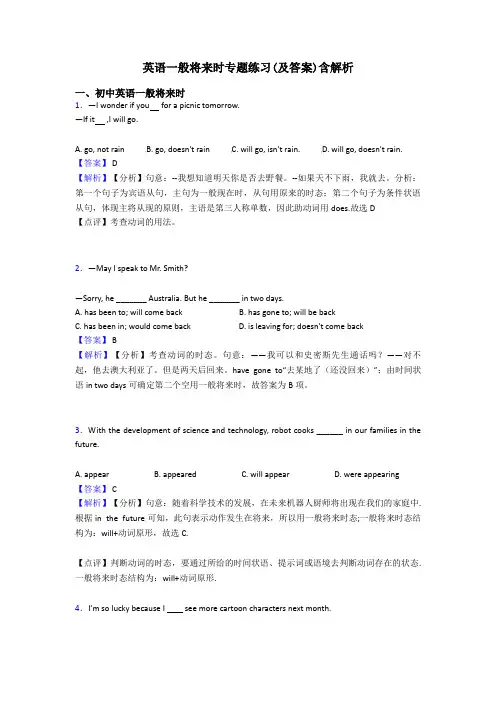
英语一般将来时专题练习(及答案)含解析一、初中英语一般将来时1.—I wonder if you for a picnic tomorrow.—If it ,I will go.A. go, not rainB. go, doesn't rainC. will go, isn't rain.D. will go, doesn't rain.【答案】 D【解析】【分析】句意:--我想知道明天你是否去野餐。
--如果天不下雨,我就去。
分析:第一个句子为宾语从句,主句为一般现在时,从句用原来的时态;第二个句子为条件状语从句,体现主将从现的原则,主语是第三人称单数,因此助动词用does.故选D【点评】考查动词的用法。
2.—May I speak to Mr. Smith?—Sorry, he _______ Australia. But he _______ in two days.A. has been to; will come backB. has gone to; will be backC. has been in; would come backD. is leaving for; doesn't come back【答案】 B【解析】【分析】考查动词的时态。
句意:——我可以和史密斯先生通话吗?——对不起,他去澳大利亚了。
但是两天后回来。
have gone to“去某地了(还没回来)”;由时间状语in two days可确定第二个空用一般将来时,故答案为B项。
3.With the development of science and technology, robot cooks ______ in our families in the future.A. appearB. appearedC. will appearD. were appearing【答案】 C【解析】【分析】句意:随着科学技术的发展,在未来机器人厨师将出现在我们的家庭中. 根据in the future可知,此句表示动作发生在将来,所以用一般将来时态;一般将来时态结构为:will+动词原形,故选C.【点评】判断动词的时态,要通过所给的时间状语、提示词或语境去判断动词存在的状态. 一般将来时态结构为:will+动词原形.4.I’m so lucky because I see more cartoon characters next month.A. is able toB. will be able toC. be able toD. was able to【答案】B【解析】【分析】句意:我真幸运因为我下个月能看到更多的卡通人物。
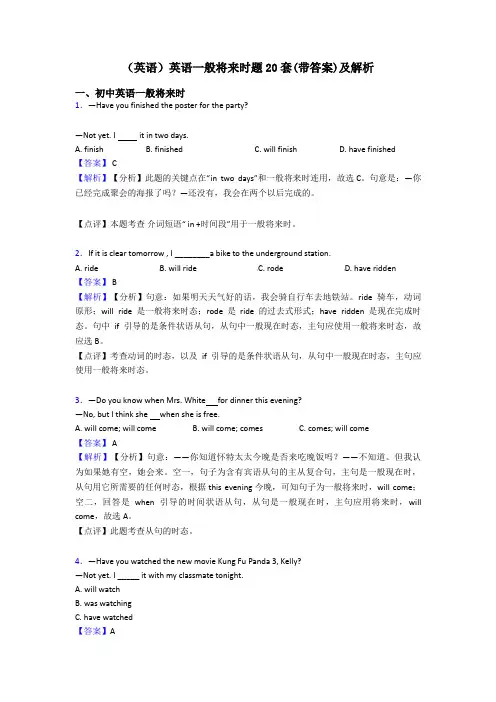
(英语)英语一般将来时题20套(带答案)及解析一、初中英语一般将来时1.—Have you finished the poster for the party?—Not yet. I it in two days.A. finishB. finishedC. will finishD. have finished【答案】 C【解析】【分析】此题的关键点在“in two days”和一般将来时连用,故选C。
句意是:—你已经完成聚会的海报了吗?—还没有,我会在两个以后完成的。
【点评】本题考查介词短语“ in +时间段”用于一般将来时。
2.If it is clear tomorrow , I ________a bike to the underground station.A. rideB. will rideC. rodeD. have ridden【答案】 B【解析】【分析】句意:如果明天天气好的话,我会骑自行车去地铁站。
ride骑车,动词原形;will ride是一般将来时态;rode是ride的过去式形式;have ridden是现在完成时态。
句中if引导的是条件状语从句,从句中一般现在时态,主句应使用一般将来时态,故应选B。
【点评】考查动词的时态,以及if引导的是条件状语从句,从句中一般现在时态,主句应使用一般将来时态。
3.—Do you know when Mrs. White for dinner this evening?—No, but I think she when she is free.A. will come; will comeB. will come; comesC. comes; will come【答案】 A【解析】【分析】句意:——你知道怀特太太今晚是否来吃晚饭吗?——不知道。
但我认为如果她有空,她会来。
空一,句子为含有宾语从句的主从复合句,主句是一般现在时,从句用它所需要的任何时态,根据this evening今晚,可知句子为一般将来时,will come;空二,回答是when引导的时间状语从句,从句是一般现在时,主句应用将来时,will come,故选A。
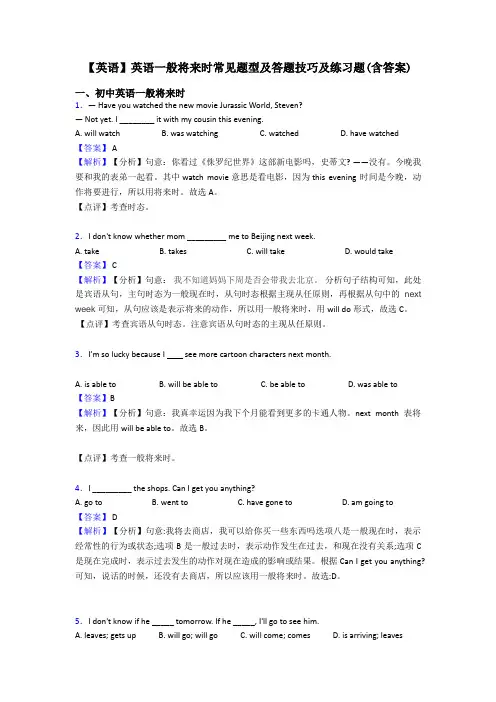
【英语】英语一般将来时常见题型及答题技巧及练习题(含答案)一、初中英语一般将来时1.— Have you watched the new movie Jurassic World, Steven?— Not yet. I ________ it with my cousin this evening.A. will watchB. was watchingC. watchedD. have watched【答案】 A【解析】【分析】句意:你看过《侏罗纪世界》这部新电影吗,史蒂文? ——没有。
今晚我要和我的表弟一起看。
其中watch movie意思是看电影,因为this evening 时间是今晚,动作将要进行,所以用将来时。
故选A。
【点评】考查时态。
2.I don't know whether mom _________ me to Beijing next week.A. takeB. takesC. will takeD. would take【答案】 C【解析】【分析】句意:我不知道妈妈下周是否会带我去北京。
分析句子结构可知,此处是宾语从句,主句时态为一般现在时,从句时态根据主现从任原则,再根据从句中的next week可知,从句应该是表示将来的动作,所以用一般将来时,用will do形式,故选C。
【点评】考查宾语从句时态。
注意宾语从句时态的主现从任原则。
3.I’m so lucky because I see more cartoon characters next month.A. is able toB. will be able toC. be able toD. was able to【答案】B【解析】【分析】句意:我真幸运因为我下个月能看到更多的卡通人物。
next month表将来,因此用will be able to。
故选B。
【点评】考查一般将来时。
4.I _________ the shops. Can I get you anything?A. go toB. went toC. have gone toD. am going to【答案】 D【解析】【分析】句意:我将去商店,我可以给你买一些东西吗迭项八是一般现在时,表示经常性的行为或状态;选项B是一般过去时,表示动作发生在过去,和现在没有关系;选项C 是现在完成时,表示过去发生的动作对现在造成的影响或结果。
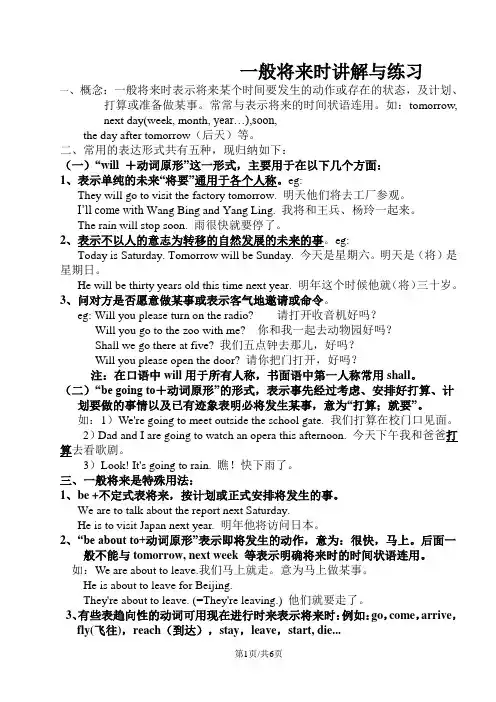
一般将来时讲解与练习一、概念:一般将来时表示将来某个时间要发生的动作或存在的状态,及计划、打算或准备做某事。
常常与表示将来的时间状语连用。
如:tomorrow,next day(week, month, year…),soon,the day after tomorrow(后天)等。
二、常用的表达形式共有五种,现归纳如下:(一)“will +动词原形”这一形式,主要用于在以下几个方面:1、表示单纯的未来“将要”通用于各个人称。
eg:They will go to visit the factory tomorrow. 明天他们将去工厂参观。
I’ll come with Wang Bing and Yang Ling. 我将和王兵、杨玲一起来。
The rain will stop soon. 雨很快就要停了。
2、表示不以人的意志为转移的自然发展的未来的事。
eg:Today is Saturday. Tomorrow will be Sunday. 今天是星期六。
明天是(将)是星期日。
He will be thirty years old this time next year. 明年这个时候他就(将)三十岁。
3、问对方是否愿意做某事或表示客气地邀请或命令。
eg: Will you please turn on the radio? 请打开收音机好吗?Will you go to the zoo with me? 你和我一起去动物园好吗?Shall we go there at five? 我们五点钟去那儿,好吗?Will you please open the door? 请你把门打开,好吗?注:在口语中will用于所有人称,书面语中第一人称常用shall。
(二)“be going to+动词原形”的形式,表示事先经过考虑、安排好打算、计划要做的事情以及已有迹象表明必将发生某事,意为“打算;就要”。
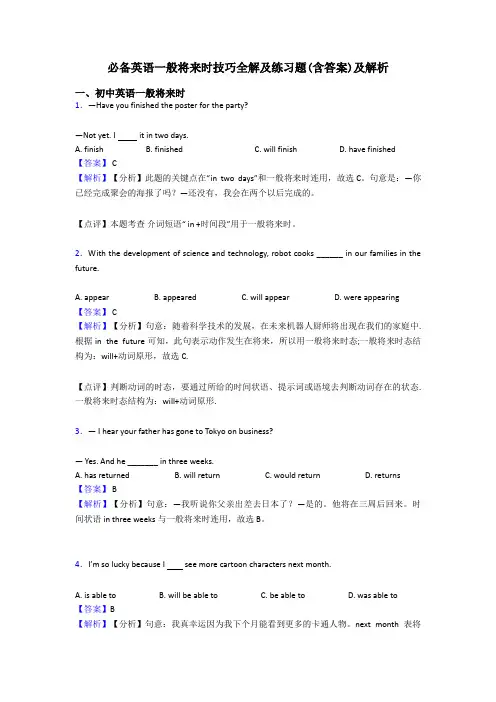
必备英语一般将来时技巧全解及练习题(含答案)及解析一、初中英语一般将来时1.—Have you finished the poster for the party?—Not yet. I it in two days.A. finishB. finishedC. will finishD. have finished【答案】 C【解析】【分析】此题的关键点在“in two days”和一般将来时连用,故选C。
句意是:—你已经完成聚会的海报了吗?—还没有,我会在两个以后完成的。
【点评】本题考查介词短语“ in +时间段”用于一般将来时。
2.With the development of science and technology, robot cooks ______ in our families in the future.A. appearB. appearedC. will appearD. were appearing【答案】 C【解析】【分析】句意:随着科学技术的发展,在未来机器人厨师将出现在我们的家庭中. 根据in the future可知,此句表示动作发生在将来,所以用一般将来时态;一般将来时态结构为:will+动词原形,故选C.【点评】判断动词的时态,要通过所给的时间状语、提示词或语境去判断动词存在的状态. 一般将来时态结构为:will+动词原形.3.— I hear your father has gone to Tokyo on business?— Yes. And he _______ in three weeks.A. has returnedB. will returnC. would returnD. returns【答案】 B【解析】【分析】句意:—我听说你父亲出差去日本了?—是的。
他将在三周后回来。
时间状语in three weeks与一般将来时连用,故选B。
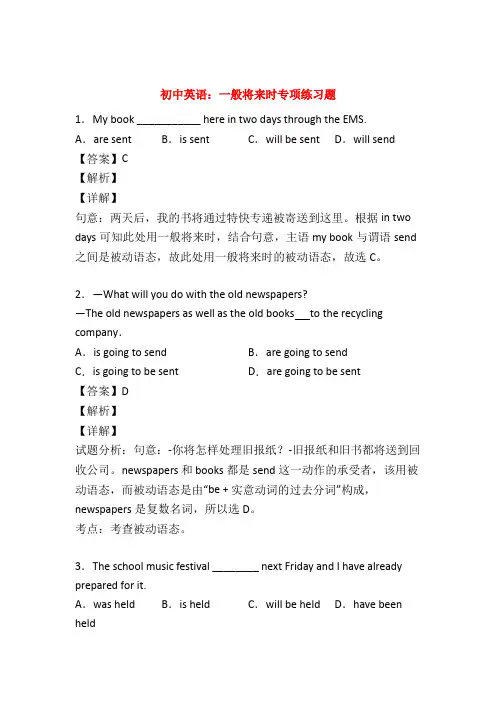
初中英语:一般将来时专项练习题1.My book ___________ here in two days through the EMS.A.are sent B.is sent C.will be sent D.will send 【答案】C【解析】【详解】句意:两天后,我的书将通过特快专递被寄送到这里。
根据in two days可知此处用一般将来时,结合句意,主语my book与谓语send 之间是被动语态,故此处用一般将来时的被动语态,故选C。
2.—What will you do with the old newspapers?—The old newspapers as well as the old books to the recycling company.A.is going to send B.are going to sendC.is going to be sent D.are going to be sent【答案】D【解析】【详解】试题分析:句意:-你将怎样处理旧报纸?-旧报纸和旧书都将送到回收公司。
newspapers 和 books都是send这一动作的承受者,该用被动语态,而被动语态是由“be + 实意动词的过去分词”构成,newspapers是复数名词,所以选D。
考点:考查被动语态。
3.The school music festival ________ next Friday and I have already prepared for it.A.was held B.is held C.will be held D.have been held【答案】C【解析】【详解】句意:学校音乐节在下周五举行,我已经准备好了。
考查一般将来时的被动语态。
was held一般过去时的被动语态;is held一般现在时的被动语态;will be held一般将来时的被动语态;have been held现在完成时的被动语态。
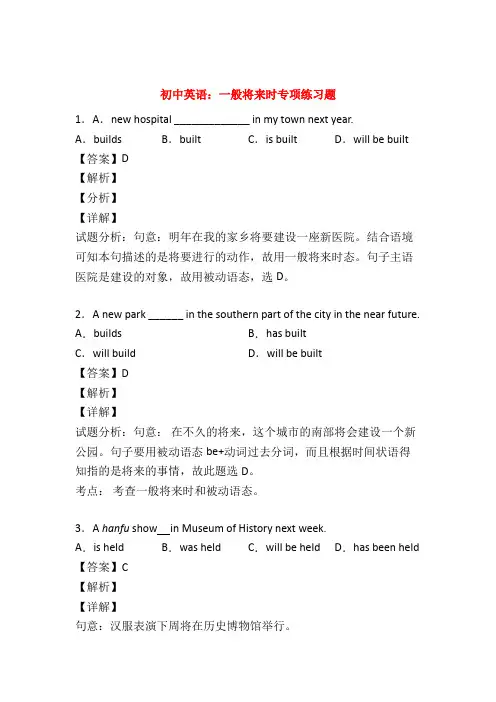
初中英语:一般将来时专项练习题1.A.new hospital _____________ in my town next year.A.builds B.built C.is built D.will be built 【答案】D【解析】【分析】【详解】试题分析:句意:明年在我的家乡将要建设一座新医院。
结合语境可知本句描述的是将要进行的动作,故用一般将来时态。
句子主语医院是建设的对象,故用被动语态,选D。
2.A new park ______ in the southern part of the city in the near future. A.builds B.has builtC.will build D.will be built【答案】D【解析】【详解】试题分析:句意:在不久的将来,这个城市的南部将会建设一个新公园。
句子要用被动语态be+动词过去分词,而且根据时间状语得知指的是将来的事情,故此题选D。
考点:考查一般将来时和被动语态。
3.A hanfu show in Museum of History next week.A.is held B.was held C.will be held D.has been held 【答案】C【解析】【详解】句意:汉服表演下周将在历史博物馆举行。
考查动词语态辨析。
next week下周,用于一般将来时;show是动词hold(举行)的受动者,需用被动语态,可排除ABD三项。
根据句意结构,可知选C。
4.﹣Would you like to go shopping with me after lunch?﹣I'd love to, but I____to go out this afternoon.A.don't allow B.will allow C.won't be allowed 【答案】C【解析】【详解】句意:-午饭后你愿意和我一起去购物吗?-我愿意去,但是今天下午我不被允许出去。
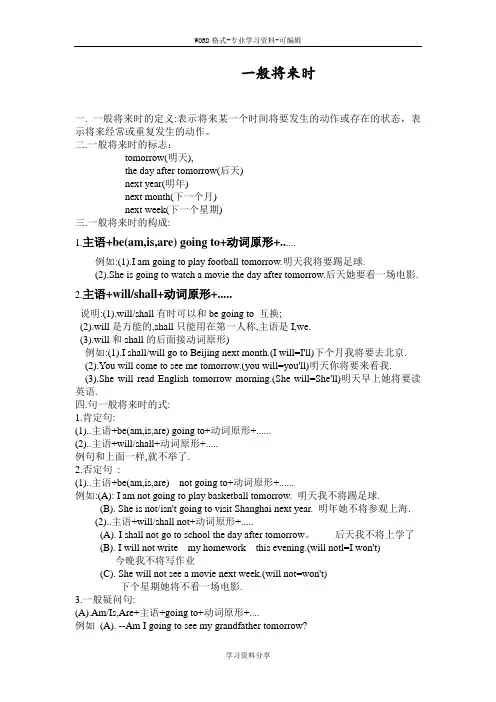
一般将来时一. 一般将来时的定义:表示将来某一个时间将要发生的动作或存在的状态,表示将来经常或重复发生的动作。
二.一般将来时的标志:tomorrow(明天),the day after tomorrow(后天)next year(明年)next month(下一个月)next week(下一个星期)三.一般将来时的构成:1.主语+be(am,is,are) going to+动词原形+......例如:(1).I am going to play football tomorrow.明天我将要踢足球.(2).She is going to watch a movie the day after tomorrow.后天她要看一场电影.2.主语+will/shall+动词原形+.....说明:(1).will/shall有时可以和be going to 互换;(2).will是万能的,shall只能用在第一人称,主语是I,we.(3).will和shall的后面接动词原形)例如:(1).I shall/will go to Beijing next month.(I will=I'll)下个月我将要去北京.(2).You will come to see me tomorrow.(you will=you'll)明天你将要来看我.(3).She will read English tomorrow morning.(She will=She'll)明天早上她将要读英语.四.句一般将来时的式:1.肯定句:(1)..主语+be(am,is,are) going to+动词原形+......(2)..主语+will/shall+动词原形+.....例句和上面一样,就不举了.2.否定句:(1)..主语+be(am,is,are) not going to+动词原形+......例如:(A): I am not going to play basketball tomorrow. 明天我不将踢足球.(B). She is not/isn't going to visit Shanghai next year. 明年她不将参观上海.(2)..主语+will/shall not+动词原形+.....(A). I shall not go to school the day after tomorrow。
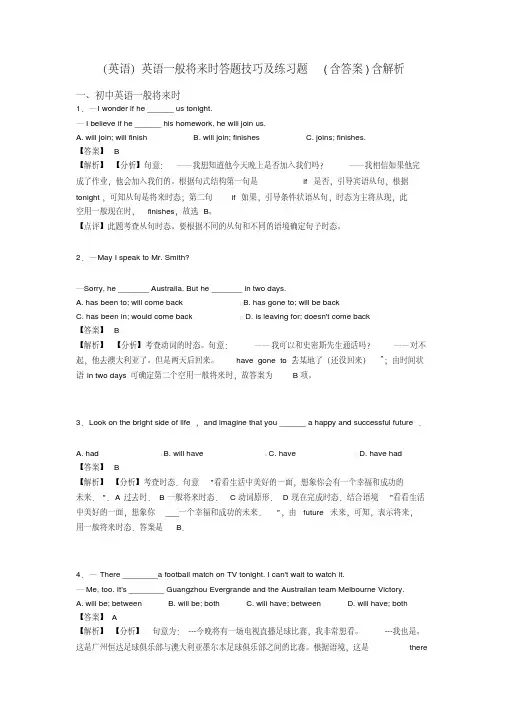
(英语)英语一般将来时答题技巧及练习题(含答案)含解析一、初中英语一般将来时1.—I wonder if he ______ us tonight.— I believe if he ______ his homework, he will join us.A. will join; will finishB. will join; finishesC. joins; finishes.【答案】 B【解析】【分析】句意:——我想知道他今天晚上是否加入我们吗?——我相信如果他完成了作业,他会加入我们的。
根据句式结构第一句是if是否,引导宾语从句,根据tonight,可知从句是将来时态;第二句if如果,引导条件状语从句,时态为主将从现,此空用一般现在时,finishes,故选B。
【点评】此题考查从句时态。
要根据不同的从句和不同的语境确定句子时态。
2.—May I speak to Mr. Smith?—Sorry, he _______ Australia. But he _______ in two days.A. has been to; will come backB. has gone to; will be backC. has been in; would come backD. is leaving for; doesn't come back【答案】 B【解析】【分析】考查动词的时态。
句意:——我可以和史密斯先生通话吗?——对不起,他去澳大利亚了。
但是两天后回来。
have gone to“去某地了(还没回来)”;由时间状语in two days可确定第二个空用一般将来时,故答案为B项。
3.Look on the bright side of life,and imagine that you ______ a happy and successful future.A. hadB. will haveC. haveD. have had【答案】 B【解析】【分析】考查时态.句意"看看生活中美好的一面,想象你会有一个幸福和成功的未来.".A过去时.B一般将来时态.C动词原形.D现在完成时态.结合语境"看看生活中美好的一面,想象你___一个幸福和成功的未来.",由future未来,可知,表示将来,用一般将来时态.答案是B.4.— There ________a football match on TV tonight. I can't wait to watch it.— Me, too. It's ________ Guangzhou Evergrande and the Australian team Melbourne Victory.A. will be; betweenB. will be; bothC. will have; betweenD. will have; both【答案】A【解析】【分析】句意为:---今晚将有一场电视直播足球比赛,我非常想看。
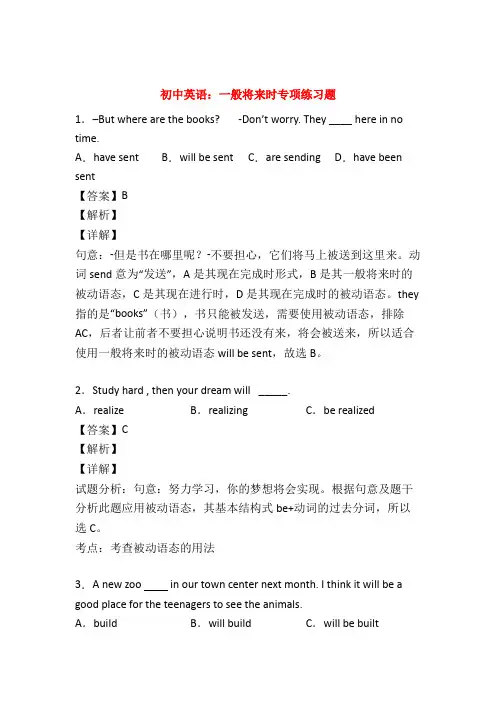
初中英语:一般将来时专项练习题1.–But where are the books? -Don’t worry. They ____ here in no time.A.have sent B.will be sent C.are sending D.have been sent【答案】B【解析】【详解】句意:-但是书在哪里呢?-不要担心,它们将马上被送到这里来。
动词send意为“发送”,A是其现在完成时形式,B是其一般将来时的被动语态,C是其现在进行时,D是其现在完成时的被动语态。
they 指的是“books”(书),书只能被发送,需要使用被动语态,排除AC,后者让前者不要担心说明书还没有来,将会被送来,所以适合使用一般将来时的被动语态will be sent,故选B。
2.Study hard , then your dream will _____.A.realize B.realizing C.be realized【答案】C【解析】【详解】试题分析:句意:努力学习,你的梦想将会实现。
根据句意及题干分析此题应用被动语态,其基本结构式be+动词的过去分词,所以选C。
考点:考查被动语态的用法3.A new zoo in our town center next month. I think it will be a good place for the teenagers to see the animals.A.build B.will build C.will be built【解析】【详解】句意:下个月我们市中心将建一个新动物园。
我想这对青少年来说是个看动物的好地方。
考查动词时态。
build建造,原形; will build将建造,一般将来时;will be built将被建造,这里是一般将来时的被动语态。
根据“next month.”可知用一般将来时,主语是“A new zoo”可知,这里是一般将来时的被动语态,其结构是will be done的形式。
英语一般将来时专题(含答案)含答案解析百度文库一、初中英语一般将来时1.There ______ a funny cartoon on CCTV 6 this evening.A. willB. will haveC. is going to beD. is going to have【答案】 C【解析】【分析】句意:今天晚上CCTV6有一部有趣的动画片。
今天晚上,将会有,用there will be 或者there is going to be因为a funny cartoon是单数。
故选C。
【点评】考查时态的用法。
2.— Let's go fishing if it this weekend.— But nobody knows if it .A. is fine; will rainB. will be rain; rainsC. will be fine; will rainD. is fine; rains 【答案】 A【解析】【分析】句意:——如果这个周末晴天我们去钓鱼吧。
——但是没人知道是否会下雨。
第一个空前的if引导条件状语从句,意思是“如果”,从句中用一般现在时表示将来;第二个空前的if引导宾语从句,意思是“是否”,根据从句的tomorrow可知用一般将来时;故选A。
【点评】考查动词的时态。
3.If you go to bed earlier, you tired in the morning.A. will feelB. don't feelC. won't feelD. didn't feel【答案】 C【解析】【分析】句意:如果你上床睡觉早些,在早上你就不会感觉到累了。
此题考查if 引导的条件状语从句,主句一般将来时,从句用一般现在时。
根据句意,故选C。
【点评】考查动词时态。
掌握主将从现的句子结构。
4.—Have you finished the poster for the party?—Not yet. I it in two days.A. finishB. finishedC. will finishD. have finished【答案】 C【解析】【分析】此题的关键点在“in two days”和一般将来时连用,故选C。
初中一般将来时练习题及答案一、动词的一般将来时形式:情态动词will/shall + 动词原形1. I (watch) a movie tonight.2. They (visit) their grandparents tomorrow.3. She (do) her homework after dinner.4. We (go) hiking this weekend.5. He (play) basketball with his friends next Sunday.6. The dog (bark) when it sees strangers.7. The students (have) a test next Monday.8. My parents (travel) to Japan next month.9. We (meet) at the park at 5 o'clock.10. Sarah (read) a book in the library this evening.答案:1. will watch2. will visit3. will do4. will go5. will play6. will bark7. will have8. will travel9. will meet10. will read二、用所给的动词的适当形式填空(有些已经给出)1. Lucy ______ (not play) computer games after school.2. The students ______ (not have) a holiday next week.3. Sam ______ (not go) swimming tomorrow.4. They ______ (not bring) any food to the party.5. We ______ (not watch) TV tonight.6. ______ she ______ (visit) her grandmother on Sunday?7. ______ you ______ (do) your homework tonight?8. ______ they ______ (travel) to Beijing next month?答案:1. will not play2. will not have3. will not go4. will not bring5. will not watch6. Will; visit7. Will; do8. Will; travel三、选择填空1. We ___________ to the beach this afternoon.A. wentB. will goC. goD. are going2. He ________ exercise every morning.A. will doB. doC. doesD. did3. ________ Alice _______ a party tomorrow?A. Will; haveB. Does; haveC. Did; haveD. Will; has4. I _________ my homework after dinner.A. will finishB. finishedC. finishD. will finished5. They ________ late for school tomorrow.A. areB. wereC. will beD. do答案:1. B2. C3. A4. A5. C四、将下列句子改写成一般将来时1. I go swimming every Sunday.2. We have a test next week.3. They travel to China every summer.4. She plays the piano every day.5. He buys a new car.答案:1. I will go swimming every Sunday.2. We will have a test next week.3. They will travel to China every summer.4. She will play the piano every day.5. He will buy a new car.总结:初中的一般将来时是由情态动词will/shall + 动词原形构成的。
(英语)英语一般将来时专项训练及答案及解析一、初中英语一般将来时1.Mr. Smith our school next year.A. will visitB. visitsC. was visitingD. visited 【答案】 A【解析】【分析】句意:史密斯先生下一年将参观我们的学校。
根据时间状语next year判断,时态为一般将来时态,故答案为A。
【点评】考查动词时态,本题涉及一般将来时的应用,表示在将来某个时间将要发生的动作或存在的状态。
2.If it is clear tomorrow , I ________a bike to the underground station.A. rideB. will rideC. rodeD. have ridden【答案】 B【解析】【分析】句意:如果明天天气好的话,我会骑自行车去地铁站。
ride骑车,动词原形;will ride是一般将来时态;rode是ride的过去式形式;have ridden是现在完成时态。
句中if引导的是条件状语从句,从句中一般现在时态,主句应使用一般将来时态,故应选B。
【点评】考查动词的时态,以及if引导的是条件状语从句,从句中一般现在时态,主句应使用一般将来时态。
3.I don't know whether mom _________ me to Beijing next week.A. takeB. takesC. will takeD. would take 【答案】 C【解析】【分析】句意:我不知道妈妈下周是否会带我去北京。
分析句子结构可知,此处是宾语从句,主句时态为一般现在时,从句时态根据主现从任原则,再根据从句中的next week可知,从句应该是表示将来的动作,所以用一般将来时,用will do形式,故选C。
【点评】考查宾语从句时态。
注意宾语从句时态的主现从任原则。
4.I’m so lucky because Isee more cartoon characters next month.A. is able toB. will be able toC. be able toD. was able to【答案】B【解析】【分析】句意:我真幸运因为我下个月能看到更多的卡通人物。
(英语)英语一般将来时解题技巧讲解及练习题(含答案)及解析一、初中英语一般将来时1.—Tom wants to know if you ________ a picnic next Sunday.—Yes. But if it ________, we'll visit the museum instead.A. will have; will rainB. have; rainsC. have; will rainD. will have; rains【答案】D【解析】【分析】句意:汤姆想知道下周日你们是否去野炊。
是的,但是如果下雨的话,我们将改去参观博物馆。
if引导宾语从句时,意为“是否”,句子时态根据句意选用,if 作为“假如”时,引导的是条件状语从句,主句用一般将来时,从句用一般现在时表示将来,故选D【点评】此考点也是中考最喜欢出现的考点,if除了可以引导条件状语从句外,还可以引导宾语从句,翻译成“是否”。
引导宾语从句时没有“主将从现”的说法。
除了if外,还有when, as soon as也一样要注意“主将从现”。
2.— Let's go fishing if it this weekend.— But nobody knows if it .A. is fine; will rainB. will be rain; rainsC. will be fine; will rainD. is fine; rains 【答案】 A【解析】【分析】句意:——如果这个周末晴天我们去钓鱼吧。
——但是没人知道是否会下雨。
第一个空前的if引导条件状语从句,意思是“如果”,从句中用一般现在时表示将来;第二个空前的if引导宾语从句,意思是“是否”,根据从句的tomorrow可知用一般将来时;故选A。
【点评】考查动词的时态。
3.I don't know whether mom _________ me to Beijing next week.A. takeB. takesC. will takeD. would take【答案】 C【解析】【分析】句意:我不知道妈妈下周是否会带我去北京。
英语一般将来时中考真题含答案推荐精选一、初中英语一般将来时1.Hold your dream,_____ you might regret some day.A. andB. orC. butD. so【答案】 B【解析】【分析】考查连词.句意:坚持你的梦想,___有一天你会后悔的。
A和,表示并列关系,B否则、或者,C但是,表示转折关系,D所以,表示因果关系。
结合语境可知,用or否则,选B.2.-- Tommy, do you know if they _____ to the zoo this Sunday if it _____?-- Sorry, I have no idea.A. will go; is fineB. go; is fineC. will go; is going to be fineD. go; will be fine【答案】 A【解析】【分析】句意:——Tommy,你知道这个星期天如果晴天他们是否去动物园吗?——对不起,我不知道。
第一个空前的if引导宾语从句,意思是“是否”,根据从句的tomorrow可知用一般将来时;第二个空前的if引导条件状语从句,意思是“如果”,从句中用一般现在时表示将来,故选A。
【点评】考查动词的时态。
3.If our government attention to controlling food safety now, our health ________ in danger.A. won't pay; isB. doesn't pay; isC. won't pay; will beD. doesn't pay; will be【答案】 D【解析】【分析】句意:如果我们的政府现在不注意控制食品安全,我们的健康就会出于危险之中。
结合语境可知本句主语描述的是将来某时进行的动作,故用一般将来时态。
当主句描述将来时态,条件状语从句中用一般现在时态表示将来动作,结合语境可知选D。
人教版英语七年级英语句型及语法(英语一般将来时)及答案解析推荐精选一、初中英语一般将来时1.There ______ a funny cartoon on CCTV 6 this evening.A. willB. will haveC. is going to beD. is going to have【答案】 C【解析】【分析】句意:今天晚上CCTV6有一部有趣的动画片。
今天晚上,将会有,用there will be 或者there is going to be因为a funny cartoon是单数。
故选C。
【点评】考查时态的用法。
2.-- Tommy, do you know if they _____ to the zoo this Sunday if it _____?-- Sorry, I have no idea.A. will go; is fineB. go; is fineC. will go; is going to be fineD. go; will be fine【答案】 A【解析】【分析】句意:——Tommy,你知道这个星期天如果晴天他们是否去动物园吗?——对不起,我不知道。
第一个空前的if引导宾语从句,意思是“是否”,根据从句的tomorrow可知用一般将来时;第二个空前的if引导条件状语从句,意思是“如果”,从句中用一般现在时表示将来,故选A。
【点评】考查动词的时态。
3.—Do you know ______?—The day after tomorrow.A. when we visited the museumB. when we will visit the museumC. when did we visit the museumD. when will we visit the museum【答案】 B【解析】【分析】句意:——你知道我们什么时候参过博物馆吗?——后天。
人教版英语七年级英语句型及语法(英语一般将来时)含答案推荐精选一、初中英语一般将来时1.— Summer holiday is coming. What are you going to do?— I'm not sure. Maybe I to the beach.A. goB. wentC. will goD. have gone【答案】 C【解析】【分析】句意:一一暑假要来了,你打算做什么?一一我不确定,可能我要去海滩。
A.一般现在时态,表示经常性、习惯性的动作;B.一般过去时态,表示过去发生的动作;C.一般将来时态,表示将要发生的动作;D.现在完成时态,强调过去发生的动作对现在造成的影响或结果.本题谈论的是暑假的计划,谈论将来,用一般将来时态。
故选C。
2.— Let's go fishing if it this weekend.— But nobody knows if it .A. is fine; will rainB. will be rain; rainsC. will be fine; will rainD. is fine; rains 【答案】 A【解析】【分析】句意:——如果这个周末晴天我们去钓鱼吧。
——但是没人知道是否会下雨。
第一个空前的if引导条件状语从句,意思是“如果”,从句中用一般现在时表示将来;第二个空前的if引导宾语从句,意思是“是否”,根据从句的tomorrow可知用一般将来时;故选A。
【点评】考查动词的时态。
3.With the development of science and technology, robot cooks ______ in our families in the future.A. appearB. appearedC. will appearD. is appearing【答案】C【解析】【分析】句意:随着科技的发展,机器人厨师将来会出现在我们的家庭中。
A是一般现在时;B是一般过去时;C是一般将来时;D是现在进行时。
句中的in the future是一般将来时的标志,故答案为C。
【点评】考查考查动词的时态,注意时间状语的暗示作用。
4.— I hear Leo will leave for Korea for a meeting.— Really? Do you know when he _______.A. will startB. to startC. started【答案】 A【解析】【分析】句意:——我听说Leo要去韩国开会。
——真的吗?你知道他什么时候出发吗?when何时,此处询问将来的时间,故用一般将来时,因此选A。
【点评】考查动词的时态。
5.Jack ______ a good rest as soon as he finishes the exam.A. hasB. hadC. is havingD. will have【答案】 D【解析】【分析】句意:Jack一完成他的考试就要好好的休息一下。
has第三人称单数形式;had是have的过去式;is having现在进行时态;will have一般将来时态。
have a rest是固定短语,意思是“休息一下”,句中的as soon as引导的是时间状语从句,从句中用一般现在时态,主句用一般将来时态,故答案选D。
【点评】考查一般将来时态。
6.—Do you know ______?—The day after tomorrow.A. when we visited the museumB. when we will visit the museumC. when did we visit the museumD. when will we visit the museum【答案】 B【解析】【分析】句意:——你知道我们什么时候参过博物馆吗?——后天。
Do you know 后接宾语从句,应使用陈述结构,因此排除C和D,根据答语The day after tomorrow.可知问句使用一般将来时,故答案是B。
【点评】考查宾语从句的语序各时态,注意宾语从句使用陈述语序,根据答语确定问句的时态。
7.—Have you finished the poster for the party?—Not yet. I it in two days.A. finishB. finishedC. will finishD. have finished【答案】 C【解析】【分析】此题的关键点在“in two days”和一般将来时连用,故选C。
句意是:—你已经完成聚会的海报了吗?—还没有,我会在两个以后完成的。
【点评】本题考查介词短语“ in +时间段”用于一般将来时。
8.—Could you tell me_______?—In five minutes, at 10: 25.A. when did the next underground arriveB. when the next underground arrivedC. when will the next underground arriveD. when the next underground will arrive【答案】D【解析】【分析】句意:—你能告诉我下一个地铁什么时候到吗?—五分钟后,10点25分。
tell后跟宾语从句,宾语从句需用陈述句语序,A、C两项都是疑问句语序,可排除。
根据答语In five minutes,结合句意语境,可知还没有到站,需用一般将来时态,故答案选D。
【点评】考查宾语从句。
根据语境确定宾语从句的时态,注意陈述语序。
9.- Do you have any plans for tonight?- Yes, I at the new Italian restaurant in town.A. eatB. have eatenC. ateD. am going to eat【答案】 D【解析】【分析】句意:——你今晚有什么计划吗? ——是的, 我打算在镇上新开的意大利饭馆吃饭。
根据句中的时间词“tonight”判断此句应是一般将来时, 结构:am/is/are+ going to do; will do.故直接选D即可。
【点评】一般将来时10.Hold your dream,_____ you might regret some day.A. andB. orC. butD. so【答案】 B【解析】【分析】考查连词.句意:坚持你的梦想,___有一天你会后悔的。
A和,表示并列关系,B否则、或者,C但是,表示转折关系,D所以,表示因果关系。
结合语境可知,用or否则,选B.11.—We _____ to Yun Brocade Museum with the exchange students this coming summer holiday.—That's amazing!A. wentB. goC. have goneD. will go【答案】D【解析】【分析】句意:——即将到来的暑假,我们将和交换生一起去云锦博物馆。
——太神奇了。
went是一般过去时;go是动词原形,一般现在时;have gone是现在完成时;will go是一般将来时。
根据this coming summer holiday可知是将来的时间,所以用一般将来时态,故答案选D。
【点评】考查动词的时态。
12.—You'd better take an umbrella. The weather report says it in the afternoon.— Thank you. I will put one in my bag.A. will rainB. rainsC. is raining【答案】 A【解析】【分析】句意:——你最好带把伞。
天气预报说是下午要下雨。
——谢谢你。
我会在包里放一个。
A一般将来时,B一般现在时,C现在进行时,根据 in the afternoon和 I will put one in my bag 可知时态是一般将来时,故选A。
【点评】考查时态,注意一般将来时的用法。
13.Could you tell me____?A. when will they leave BeijingB. when would they leave BeijingC. when they will leave BeijingD. when they would leave Beijing【答案】 C【解析】【分析】句意:你能告诉我他们什么时候离开北京吗?这是含有宾语从句的主从复合句。
从句用陈述语序,疑问词+主语+谓语,故排除A B;主句中的could表示语气的委婉,不是过去时。
根据句意,从句用一般将来时。
故选C。
【点评】此题考查宾语从句。
注意从的语序和时态。
14.Mr. Green, a famous writer, ______our school next week.A. visitedB. visitsC. was visitingD. will visit【答案】 D【解析】【分析】句意:格林先生,一位著名的作家,下周要来我们学校参观。
A是一般过去时;B是一般现在时;C是过去进行时;D是一般将来时。
根据next week可知此处用一般将来时,故答案为D。
【点评】考查动词的时态,注意找语境中的时间状语。
15.We ________ a party for Kate. It's supposed to be a surprise.A. were havingB. hadC. will haveD. have had【答案】C【解析】【分析】句意:我们将为凯特举办一个聚会。
这应该是个惊喜。
根据句意语境可知举办聚会这个动作还没有发生,需用一般将来时,故选C。
【点评】考查动词时态辨析题。
熟练掌握时态的用法。
16.— There ________a football match on TV tonight. I can't wait to watch it.— Me, too. It's ________ Guangzhou Evergrande and the Australian team Melbourne Victory.A. will be; betweenB. will be; bothC. will have; betweenD. will have; both【答案】A【解析】【分析】句意为:---今晚将有一场电视直播足球比赛,我非常想看。